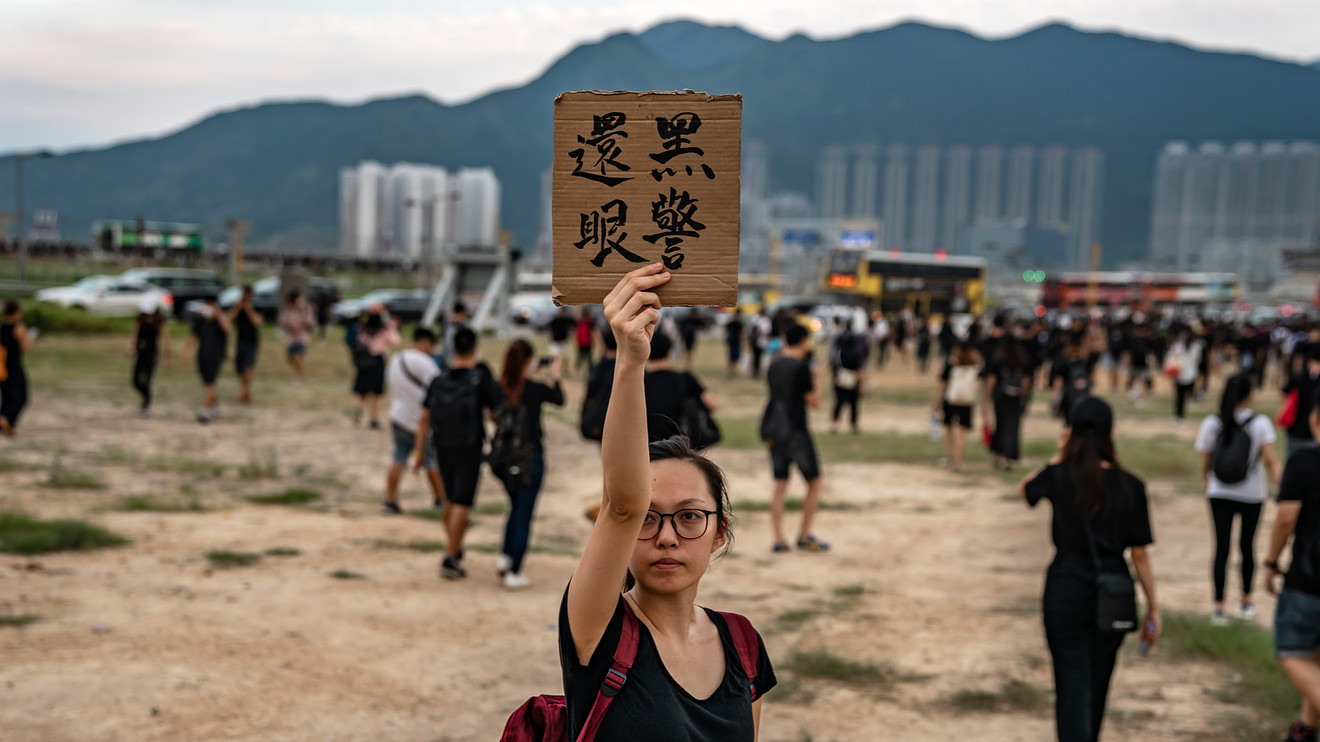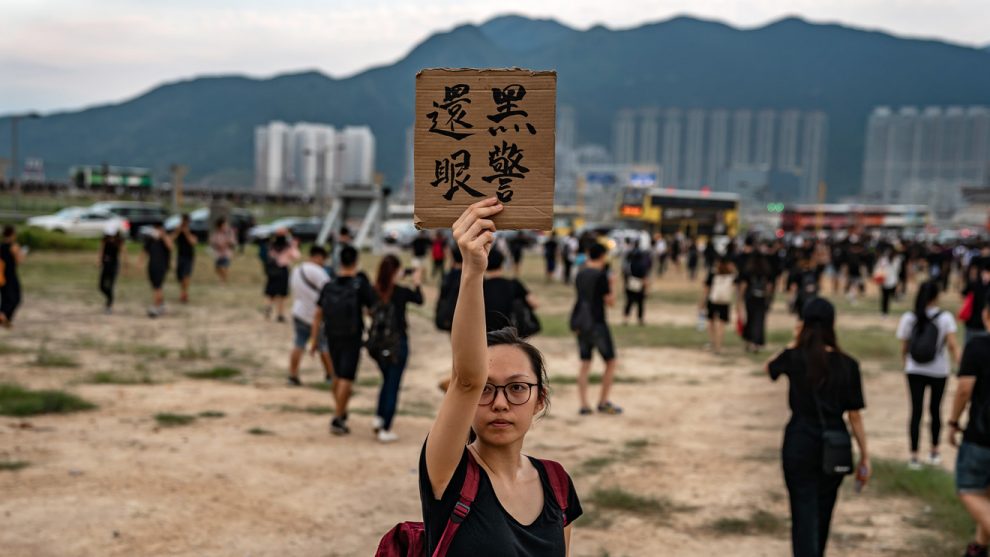
Protests in Hong Kong that have persisted for the past two months could eventually deliver a more lasting blow to U.S. and global markets, market strategists and geopolitical experts told MarketWatch.
Tear-gas filled clashes between police and antigovernment protesters have continued for 10 straight weeks, with demonstrators on Tuesday shutting down flights out of the Hong Kong International Airport for a second straight day and resulting in Chinese officials using the term “terrorism” to describe the intensifying conflict. On Tuesday, protesters blocked the gates to security and immigration areas and snarled the airport, according to the Wall Street Journal.
Why are people protesting?
Protesters are railing against an extradition bill introduced in April that would see Hong Kong citizens extradited to mainland China to face trial if suspected of crimes against the People’s Republic. Protesters have made a number of further requests of the Chinese government, including amnesty for all those jailed in the current protests and the complete withdrawal of the bill.
Why is China dictating what Hong Kong does?
Sovereignty of Hong Kong was transferred to the People’s Republic of China on midnight July 1, 1997, ending more than 150 years of British rule and wrapping up a 13-year handover process that began in 1984.
Under the terms of its postcolonial constitution, Hong Kong was intended to operate with a high degree of autonomy from China: This relationship is described as “one country, two systems,” and has “signified that Hong Kong enjoys its own autonomous ‘system’ within the larger system of the nation as a whole,” explained Suzanne Pepper, a Hong Kong-based writer in a March blog post.
Hong Kong uses its own local currency, the Hong Kong dollar USDHKD, -0.0013%, rather than China’s yuan USDCNY, +0.1502%, which is used throughout the mainland. Hong Kong also has its own judiciary system and is represented separately throughout the world, in places like the World Trade Organization and at Olympic Games, for example.
So what does the Hong Kong clash mean for markets?
Along with trade tensions between the U.S. and China, the confrontation in Hong Kong has rattled investor confidence.
“Tensions are rising in Hong Kong and the clashes between protesters and police are circulating around the globe, and that has chipped away at investor confidence in the West,” wrote David Madden, market analyst at CMC Markets U.K., in a Monday research note.
The Hong Kong Hang Seng HSI, -2.10% tumbled 2.1% on Tuesday and is down 9% so far in August and off 11.5% over the past three months, according to FactSet data. The exchange traded iShares MSCI Hong Kong ETF EWH, -3.66%, one of the most popular funds used to gain exposure to Hong Kong stocks, was down 3.2% in Monday and has fallen 9.5% so far in August and 12.4% over the past 90 days.
In the U.S., the Dow Jones Industrial Average DJIA, -0.13%, the S&P 500 index SPX, -0.08% and the Nasdaq Composite Index COMP, -0.02% were all set to slip in Tuesday trade, amid worries pegged to Sino-American trade clashes and fears that the clash in Hong Kong could intensify.
What happens if the Hong Kong conflict worsens?
The concern is that the Chinese government could look to clamp down on what it may view as an insurrection, which may invoke memories of Tiananmen Square, when the Chinese military in May of 1989 violently cracked down on student protesters in a bloody confrontation shown around the world.
See also: Opinion: A Tiananmen ‘solution’ in Hong Kong would destroy its economy
Some fear that China declaring the protests an act of terror could lead to military action by Beijing. China has 6,000 to 10,000 People’s Liberation Army troops stationed in Hong Kong, according to The Wall Street Journal.
Market participants say that heightened tensions or a bloody clash could roil global markets because Hong Kong is seen as a financial hub and problems in the region could also stall any chance of a near-term Sino-American trade resolution.
“The increasing tension in Hong Kong, which could lead to greater intervention by mainland Chinese authorities, poses a risk to the region because Hong Kong is a major financial center and its disruption could have implications for markets in Asia as well as spillover to Europe and the U.S.,” Chris Zaccarelli, chief investment officer at Independent Advisor Alliance, told MarketWatch via email.
“In addition, the Chinese media have already accused the U.S. of being behind the protests — or at least encouraging them — tying the unrest in Hong Kong to the greater trade dispute with the U.S.,” Zaccarelli said.
Ultimately, a harsh response to protesters by China’s PLA, including loss of life, could make it unpalatable for the Trump administration to forge a grand trade deal.
“The big fear is that Beijing could respond with force of the kind seared into memories about Tiananmen Square. If so, assessments of the Politburo would also have to be revised to stand at a more pessimistic view. In turn, markets would have to become less hopeful of the degree and speed of progress possible on a whole host of fronts, including trade,” Ken Odeluga, market analyst at City Index told MarketWatch.
Zaccarelli said that even if Trump were willing to overlook a violent crackdown, it isn’t clear that Congress would.
Hong Kong woes could spell trouble for Asian neighbors
If matters get worse in Hong Kong it could ripple to other Asian markets and hasten a slowdown already at hand in the region.
“More practically, rising political disquiet in the Asia-Pacific region is a growth issue too. As such, it’s entirely rational for global markets to retreat if the HK situation looks like it’s reaching a critical juncture,” Odeluga said.
James Meyer, analyst at Tower Bridge Advisors, concurred with that assessment in a Monday research report: “Tensions in Hong Kong add risk to world economic growth should they lead to violent confrontation. They aren’t at that level yet, but today’s sit-in at Hong Kong’s airport leads to a situation that the government won’t tolerate forever,” he wrote.
“No one, including the Chinese government, wants to see anything that resembles [Tiananmen]. The Chinese government hopes that once schools reopen for fall semester, the size of the protests will shrink,” Meyer wrote.












